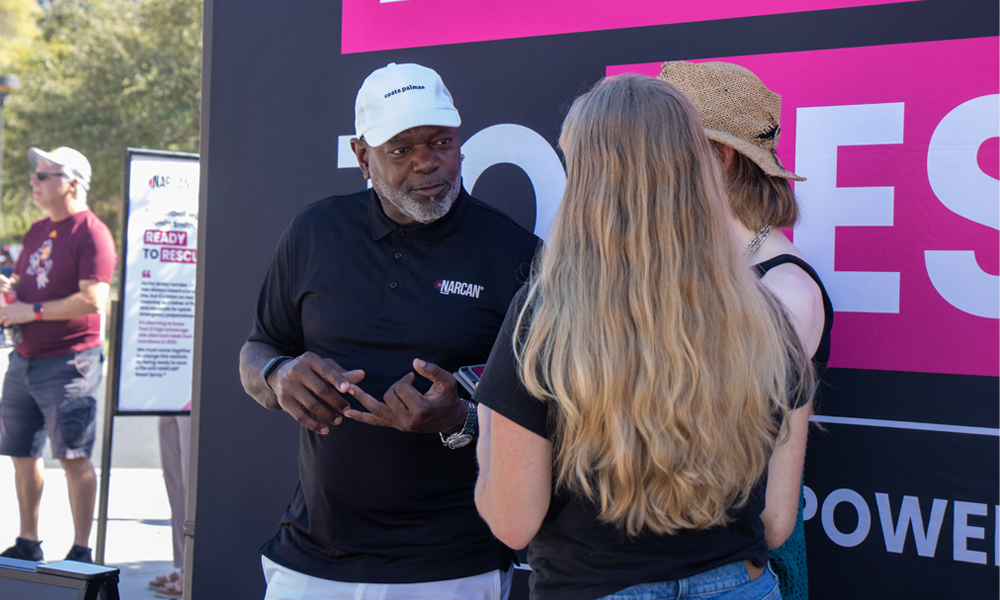Rushing to the rescue: NFL Legend Emmit Smith and the campaign against opioid overdoses

In 1993, future Pro Football Hall of Famer and running back for the Dallas Cowboys, Emmitt Smith, won the NFL’s most valuable player award, and for the January 1994 Super Bowl, he won Super Bowl MVP.
In 2002, he broke Walter Payton’s all time rushing record, and at the time of his retirement in 2004 he held seven NFL records.
It’s not these dates in history that motivate Smith now.
“I lost a teammate back in the late ‘90s to a drug overdose,” Smith said. “And my sister-in-law, who was dealing with stage 4 colon cancer… she ended up having too much medication at some point and went into a drug overdose.”
Smith was at Arizona State University attending the Sun Devil’s Big 12 home opener versus Kansas on Saturday, Oct. 5. There with Emergent BioSolutions, the supplier of NARCAN Nasal Spray, as part of the Ready to Rescue campaign, Smith was looking to create as memorable a legacy off the field.
“I think it's a great campaign,” Smith said. “We have to continue to spread awareness and the word around to let people know that it's not a stigma. It's a reality that we must be dealing with. And we have to give people knowledge. We have to continue to spread the word.”
Smith also spoke of a close friend, who had a son pass away from an overdose recently, and the importance of getting this information to college-age students.
“One thing about this opioid epidemic is it’s not racial. It doesn't discriminate at all. It attacks whomever, wherever there's a weakness,” Smith explained. “College kids and young adults, late night studying, want to take some medication to stay up, anxiety, a lot of different things that we all are dealing with from a mental health standpoint.
According to recent data from The New England Journal of Medicine, opioid misuse and dependency is the highest among young adults ages 18 to 25 and Maricopa County had the highest teen overdose death rate in the United States in 2022.
Mason DoVico, the Tempe Undergraduate Student Body President studying Political Science and Business, was present at the Ready to Rescue campaign, and spoke to combating these concerning statistics within the local community.
“With the prevalence of opioid misuse and overdose in Arizona, this initiative seeks to save lives by destigmatizing the use of NARCAN and educating students about its proper administration,” DoVico said. “Our goal is to foster a community that prioritizes health and safety, ensuring students have access to life-saving tools and knowledge.”
DoVico, alongside the Tempe Undergraduate Student Government (USG), have been on their own coordinated campaign to end the stigma around topics such as overdose prevention, and create a safer campus.
“Students should understand that campaigns like Ready to Rescue are about empowerment, education, and compassion,” DoVico said. “Carrying NARCAN is a simple step that anyone can take to potentially save a life”
“As a leader committed to advocating for the well-being of all students, I see Ready to Rescue as a critical step toward addressing preventable crises and empowering our community with the resources to protect one another,” DoVico continued.
Smith also emphasized the importance of community care and how those around can help educate themselves to make a difference.
“This is one of the reasons why we're here, to continue to encourage people to not only be very cognizant of the medications they're getting and where they're getting it from, but also just to be ready to have Narcan nasal spray just in case,” Smith said. “Whether it's through training, whether it's through knowledge, whether it's through the Ready Rescue Campaign, or being alone with a Narcan nasal spray, we all have the ability to help another person.”
Understanding both the severity of these drugs and their consequences, Smith looks to bring attention to this ongoing crisis.
“I think college students need to start to broaden their minds around the seriousness of what this epidemic is really doing to young people, as well as loved ones, friends and family members,” Smith continued. “So, just don't stick your head in the sand and try to ignore the signs or ignore that it's not happening because you don't do drugs.”
Smith spoke to the culture of care and support necessary to make impactful change on the opioid epidemic.
“We can allow this planet to be destroyed by us because we don't want to inhabit it. Or we can take the responsibility individually, collectively as a group and do something about it,” Smith stated. “As long as Fentanyl is out in the air, as long as people are taking advantage of the illness of another person… We need to get back to being responsible, and the first responsibility is taking care of ourselves. And then not only how we take care of ourselves, but how we take care of others.”
“It's about one life, one opportunity to impact more than one way. You don't have to be an athlete. You can be a college student to impact another person's life.”
There are plenty of opportunities to be that student, with DoVico and the Tempe USG working alongside ASU Health services to offer life-saving Naloxone at no cost.
“USG-Tempe has worked closely with ASU Health Services to enhance access to life-saving resources, such as providing Narcan in all ASU Health Services buildings across all campuses,” DoVico said. “We are also pursuing the implementation of Narcan on all floors of ASU residence halls, including the Greek Leadership Village, to ensure immediate accessibility during emergencies.”
Naloxone is also available for purchase at local pharmacies. For more information about opioid overdose reversal medication, visit wellness.asu.edu/naloxone.